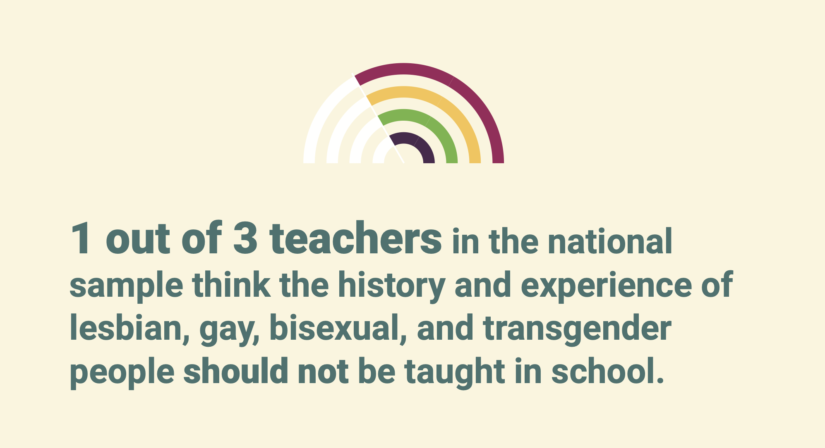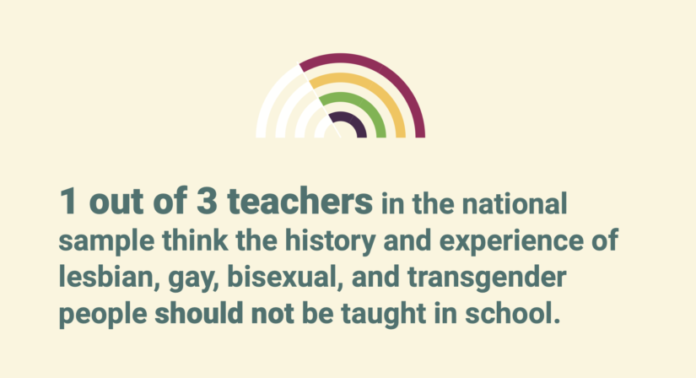Sign up here for The 74’s daily newsletter. Donate here to support The 74’s independent journalism.
One out of three teachers doesn’t think the history and experience of lesbian, gay, bisexual and transgender people should be taught in schools, according to a recent survey by Educators for Excellence. More than one-fourth — 27% — say their schools rarely or never meet the needs of their LGBTQ students, while 11% believe their school does not enroll any at all.
“We were just shocked and frankly a little bit alarmed at the low levels around teachers’ responses about the LGBTQ students in their classrooms and schools,” said Evan Stone, co-CEO of the organization, popularly known as E4E. “With the rates of bullying and mental health issues, this is a population where teachers are particularly concerned about engagement in school and, as a result, academic achievement.”
The findings show a sharp decline in educators’ perceptions of how well schools are serving LGBTQ youth. In a 2020 survey, 41% of respondents said their schools often meet these students’ needs, a number that fell to 31% the following year and 22% this year.
Stone attributed the rising reluctance to address sexual orientation and gender identity to the surge in anti-LGBTQ legislation like Florida’s new “Don’t Say Gay” law. “There has been a chilling effect across the country on teachers’ comfort talking about issues of gender and sexuality,” he said. “Teachers are nervous about parents’ reactions, or nervous about what they can or should say.”
Hundreds of bills targeting LGBTQ Americans have been introduced in state legislatures this year, many aimed at transgender youth. Past experiences in states and districts that try to limit what educators can say to students show that teachers often fear the policies prohibit them from intervening when students are bullied.
Research consistently finds that LGBTQ students subjected to in-school bullying and victimization have poorer educational outcomes, including lower attendance, grade-point averages and rates of college enrollment, than their heterosexual, cis-gendered peers. If LGBTQ students are specifically named in anti-harassment policies, they are more likely to be protected in school.
Even teachers in states where gay rights have not been a political flashpoint have expressed fear, Stone added, pointing to responses to the survey’s findings among members of an E4E teacher leadership council.
“Because of the culture of fear that’s been created, teachers are afraid to have these conversations with their students,” Leona Fowler, a teacher in Queens, New York, is quoted as saying in a report on the findings. “They have to find subtle ways to bring it up, to challenge gender stereotypes and censorship. But we don’t have the support, resources or curriculum to know how to do that effectively.”
The survey was administered in January and February to a nationally representative sample of 1,000 teachers, 77% of whom were white, as well as an additional 300 teachers of color. In contrast to the one-third of teachers overall who said gender and sexual orientation should not be taught, 97% of Black, Latino and Indigenous teachers said LGBTQ issues should be discussed in class, and 69% said their schools were failing their queer students.
Respondents in the national sample overall said their schools met the needs of students with disabilities and students of color half the time, homeless students and foster youth a third of the time and English learners 37% of the time.
Support for teaching LGBTQ subjects ranked lowest among 14 topics polled, with 99% of teachers saying the Civil War should be taught and 78% saying systemic racism should be discussed in schools.
Teachers of color were more likely to support introducing LGBTQ history in earlier grades, with 75% saying middle school was an appropriate time, versus 42% of the national sample. Just 18% of both groups approved of instruction in elementary grades, while 65% and 60%, respectively, favored high school. None of the educators of color in the supplemental sample believed their school didn’t enroll any LGBTQ students.
The disparity between the views of teachers of color and the majority white sample did not surprise Stone, who said the numbers mirror past polls. “In general — and this is true across multiple years of the survey — that our [Black, Latino and Indigenous] teachers are more likely to say their schools are struggling and not supporting all groups of students. And I would say they have a more realistic lens on what achievement looks like in their buildings.”
The poll also revealed discrepancies in teacher views by age, with 32% of those 50 and older opposing instruction covering gender and sexual orientation, as opposed to 18% of educators younger than 30.

The University of California Los Angeles’ Williams Institute estimates 10% of Americans ages 13 to 17 identify as something other than heterosexual or cis-gendered. In June, President Joe Biden issued an executive order bolstering LGBTQ rights that called for greater collection of data on queer students’ experiences in school.
Among educators who want to teach LGBTQ history and culture, Stone said E4E leaders hear concerns that a pervasive lack of training and classroom materials leave teachers unsure they can address topics accurately and respectfully. “When we have follow-up conversations with educators, what they’re saying is the reason it’s not happening is [they] haven’t been supported,” he said. “We don’t have the curriculum, we don’t have the tools and teachers are worried they’re going to do it wrong.”
An Education Week poll of teachers and school and district leaders administered in November and December found even softer teacher support for teaching LGBTQ topics, with 57% saying instruction is appropriate.
The E4E report directs educators who want guidance on inclusive teaching and resources for meeting LGBTQ students’ needs to GLSEN, a national school clearinghouse on addressing sexual orientation and gender identity in schools.
Disclosure: Walton Family Foundation, the Carnegie Corporation of New York, the Joyce Foundation and the Charles and Lynn Schusterman Family Philanthropies provide financial support to Educators for Excellence and The 74.








